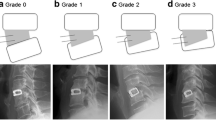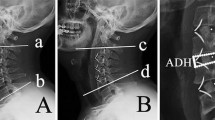Abstract
A variety of bone graft substitutes, interbody cages, and anterior plates have been used in cervical interbody fusion, but no controlled study was conducted on the clinical performance of β-tricalcium phosphate (β-TCP) and the effect of supplemented anterior plate fixation. The objective of this prospective, randomized clinical study was to evaluate the effectiveness of implanting interbody fusion cage containing β-TCP for the treatment of cervical radiculopathy and/or myelopathy, and the fusion rates and outcomes in patients with or without randomly assigned plate fixation. Sixty-two patients with cervical radiculopathy and/or myelopathy due to soft disc herniation or spondylosis were treated with one- or two-level discectomy and fusion with interbody cages containing β-TCP. They were randomly assigned to receive supplemented anterior plate (n = 33) or not (n = 29). The patients were followed up for 2 years postoperatively. The radiological and clinical outcomes were assessed during a 2-year follow-up. The results showed that the fusion rate (75.0%) 3 months after surgery in patients treated without anterior cervical plating was significantly lower than that (97.9%) with plate fixation (P < 0.05), but successful bone fusion was achieved in all patients of both groups at 6-month follow-up assessment. Patients treated without anterior plate fixation had 11 of 52 (19.2%) cage subsidence at last follow-up. No difference (P > 0.05) was found regarding improvement in spinal curvature as well as neck and arm pain, and recovery rate of JOA score at all time intervals between the two groups. Based on the findings of this study, interbody fusion cage containing β-TCP following one- or two-level discectomy proved to be an effective treatment for cervical spondylotic radiculopathy and/or myelopathy. Supplemented anterior plate fixation can promote interbody fusion and prevent cage subsidence but do not improve the 2-year outcome when compared with those treated without anterior plate fixation.






Similar content being viewed by others
References
Agrillo U, Mastronardi L, Puzzilli F (2002) Anterior cervical fusion with carbon fiber cage containing coralline hydroxyapatite: preliminary observations in 45 consecutive cases of soft-disc herniation. J Neurosurg 96(3 Suppl):273–276
Bartels RH, Donk RD, Feuth T (2006) Subsidence of stand-alone cervical carbon fiber cages. Neurosurgery 58:502–508
Bartels RH, Donk R, van Azn RD (2001) Height of cervical foramina after anterior discectomy and implantation of a carbon fiber cage. J Neurosurg 95(1 Suppl):40–42
Bishop RC, Moore KA, Hadley MN (1996) Anterior cervical interbody fusion using autogenic and allogenic bone graft substrate: a prospective comparative analysis. J Neurosurg 85:206–210
Carreon LY, Glassman SD, Djurasovic M (2007) Reliability and agreement between fine-cut CT scans and plain radiography in the evaluation of posterolateral fusions. Spine J 7:39–43
Cho DY, Lee WY, Sheu PC, Chen CC (2005) Cage containing a biphasic calcium phosphate ceramic (Triosite) for the treatment of cervical spondylosis. Surg Neurol 63:497–504
Christodoulou A, Ploumis A, Terzidis I, Hantzidis P, Tapsis K, Pournaras J (2004) Combined interbody cage and anterior plating in the surgical treatment of cervical disc disease. Acta Orthop Belg 70:461–465
Cloward RB (1958) The anterior approach for ruptured cervical discs. J Neurosurg 15:602–614
Cook SD, Dalton JE, Tan EH, Tejeiro WV, Young MJ, Whitecloud TS III (1994) In vivo evaluation of anterior cervical fusions with hydroxylapatite graft material. Spine 19:1856–1866
Dai LY, Jiang LS (2008) Single-level instrumented posterolateral fusion of lumbar spine with β-tricalcium phosphate versus autograft: a prospective, randomized study with 3-year follow-up. Spine (in press)
Gercek E, Arlet V, Delisle J, Marchesi D (2003) Subsidence of stand-alone cervical cages in anterior interbody fusion: warning. Eur Spine J 12:513–516
Hacker RJ, Cauthen JC, Gilbert TJ, Griffith SL (2000) A prospective randomized multicenter clinical evaluation of an anterior cervical fusion cage. Spine 25:2646–2655
Japanese Orthopaedic Association (1994) Scoring system for cervical myelopathy. J Jpn Orthop Assoc 68:490–503
Kettler A, Wilke HJ, Claes L (2001) Effects of neck movements on stability and subsidence in cervical interbody fusion: an in vitro study. J Neurosurg 94(1 Suppl):97–107
Lind BI, Zoega B, Rosen H (2007) Autograft versus interbody fusion cage without plate fixation in the cervical spine: a randomized clinical study using radiostereometry. Eur Spine J 16: 1251–1256
Mastronardi L, Ducati A, Ferrante L (2006) Anterior cervical fusion with polyetheretherketone (PEEK) cages in the treatment of degenerative disc disease: preliminary observations in 36 consecutive cases with a minimum 12-month follow-up. Acta Neurochir 148:307–312
Matge G (1998) Anterior interbody fusion with the BAK-cage in cervical spondylosis. Acta Neurochir 140:1–8
McConnell JR, Freeman BJ, Debnath UK, Grevitt MP, Prince HG, Webb JK (2003) A prospective randomized comparison of coralline hydroxyapatite with autograft in cervical interbody fusion. Spine 28:317–323
Payer M, May D, Reverdin A, Tessitore E (2003) Implantation of an empty carbon fiber composite frame cage after single-level anterior cervical discectomy in the treatment of cervical disc herniation: preliminary results. J Neurosurg 98(2 Suppl):143–148
Pintar FA, Maiman DJ, Hollowell JP, Yoganandan N, Droese KW, Reinartz JM, Cuddy B (1994) Fusion rate and biomechanical stiffness of hydroxylapatite versus autogenous bone grafts for anterior discectomy: an in vivo animal study. Spine 19:2524–2528
Robinson RA, Smith GW (1955) Anterolateral cervical disc removal and interbody fusion for cervical disc syndrome. Bull Johns Hopkins Hosp 96:223–224
Samandouras G, Shafafy M, Hamlyn PJ (2001) A new anterior cervical instrumentation system combining an intradiscal cage with an integrated plate: an early technical report. Spine 26:1188–1192
Santos ER, Goss DG, Morcom RK, Fraser RD (2003) Radiologic assessment of interbody fusion using carbon fiber cages. Spine 28:997–1001
Shah RR, Mohammed S, Saifuddin A, Taylor BA (2003) Comparison of plain radiographs with CT scan to evaluate interbody fusion following the use of titanium interbody cages and transpedicular instrumentation. Eur Spine J 12:378–385
Shimamoto N, Cunningham BW, Dmitriev AE, Minami A, McAfee PC (2001) Biomechanical evaluation of stand-alone interbody fusion cages in the cervical spine. Spine 26:E432–E436
Suetsuna F, Yokoyama T, Kenuka E, Harata S (2001) Anterior cervical fusion using porous hydroxyapatite ceramics for cervical disc herniation: a two-year follow-up. Spine J 1:348–357
Wilke HJ, Kettler A, Goetz C, Claes L (2000) Subsidence resulting from simulated postoperative neck movements. Spine 25:2762–2770
Xie Y, Chopin D, Hardouin P, Lu J (2006) Clinical, radiological and histological study of the failure of cervical interbody fusions with bone substitutes. Eur Spine J 15:1196–1203
Author information
Authors and Affiliations
Corresponding author
Additional information
This study was supported by Shanghai Natural Science Foundation (No. 044119626).
Rights and permissions
About this article
Cite this article
Dai, LY., Jiang, LS. Anterior cervical fusion with interbody cage containing β-tricalcium phosphate augmented with plate fixation: a prospective randomized study with 2-year follow-up. Eur Spine J 17, 698–705 (2008). https://doi.org/10.1007/s00586-008-0643-8
Received:
Revised:
Accepted:
Published:
Issue Date:
DOI: https://doi.org/10.1007/s00586-008-0643-8




